#ik onkar
Explore tagged Tumblr posts
Text
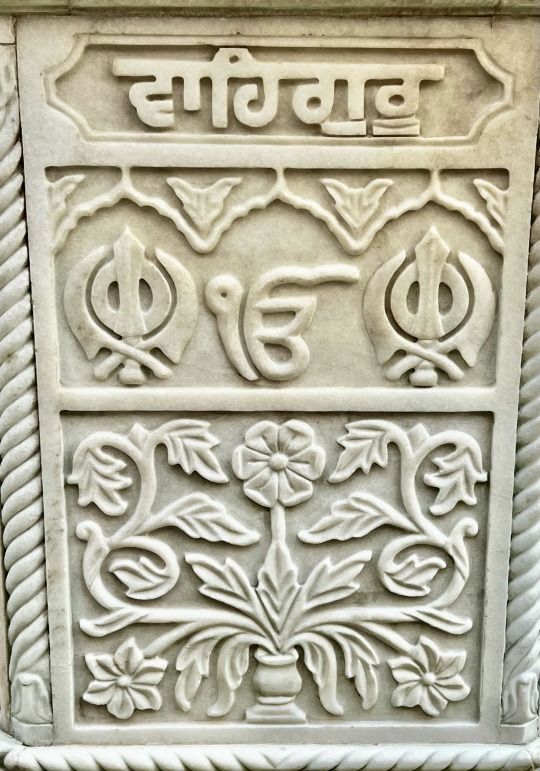
Gurdwara Sis Ganj Sahib, Chandni Chowk, New Delhi
24 notes
·
View notes
Text
Guru Gobind Singh's Wisdom: Enquiry for Personal Development and Management Excellence
In a world filled with complexities, Guru Gobind Singh’s teachings shine as a beacon of light, guiding us not only spiritually but also in the practical realms of life. Born in Patna, Bihar, Guru Gobind Singh, the tenth Sikh Guru, left a legacy of spiritual wisdom and martial strength. His teachings, based on the spiritual foundation laid by Guru Nanak, go beyond religious boundaries, offering…
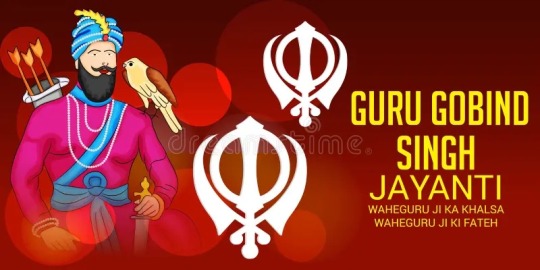
View On WordPress
#Guru Gobind Singh#Ik Onkar#Jayanti celebration#Managerial skills#Personal development#Spiritual discipline#warrior spirit
0 notes
Text
Thinking abt those times as a kid when before I even knew trans or nonbianary were things I’d make up alien species where there was either like 1 gender or like. 4 or smth and when these aliens interacted with humans they’d always be confused over the human concepts of gender
and some of them would use he/she, some would use it, once i wrote a story that involved God and just refered to God as The One (this part was kinda based of off the idea of Ik Onkar, but i also didn’t like the idea of putting human pronouns on God, so I didn’t use any)
and this was before i even knew anything abt trans ppl, about non binary people. I lost a lot of these stories to time, but i still have the one with God and a few others. Looking back, damn. I always was like this: i just didn’t have the words.
7 notes
·
View notes
Text
How did the Sikh religion come to birth? Who were the 10 Gurus ?
The Sikh religion, also known as Sikhism, was founded in the late 15th century in the Indian subcontinent by Guru Nanak Dev Ji, the first of the ten Sikh Gurus. Sikhism emerged as a distinct religious and spiritual movement that sought to bridge the gap between Hinduism and Islam, emphasizing the oneness of God and the equality of all human beings.
The birth of Sikhism can be traced back to the life and teachings of Guru Nanak Dev Ji (1469-1539). He was born in the village of Talwandi, which is now known as Nankana Sahib in present-day Pakistan. Guru Nanak belonged to a Hindu family, but from a young age, he showed a profound interest in spirituality and a questioning mind. He embarked on numerous spiritual journeys, engaging in deep contemplation and seeking spiritual truths.
The pivotal moment that marked the beginning of Sikhism occurred when Guru Nanak had a spiritual experience during one of his meditations. He emerged from this experience with a profound realization of the divine unity that underlies all existence. He proclaimed, "There is no Hindu, there is no Muslim," emphasizing the universal nature of spirituality and the oneness of God.
Guru Nanak's teachings revolved around the concept of one God (Ik Onkar) and the rejection of rituals, caste system, and religious divisions. He advocated the importance of selfless service, equality, compassion, and the pursuit of an honest and meaningful way of life.
Throughout his life, Guru Nanak traveled extensively, spreading his teachings and gathering disciples who were inspired by his message. His followers came to be known as Sikhs, a term derived from the Sanskrit word "shishya," meaning disciple or student.
After Guru Nanak, the mantle of leadership passed to nine more Gurus, each contributing to the development and consolidation of Sikhism. The Guru Granth Sahib, the holy scripture of the Sikhs, includes the writings of Guru Nanak and the subsequent Gurus, along with compositions of saints from different religious backgrounds.
Sikhism was established and developed by ten Gurus during the period 1469 to 1708. Sikhs regard the ten Gurus not as divine, but as enlightened teachers through whom God revealed his will. Each Guru appointed his successor. Guru Nanak Dev was the first Guru and Guru Gobind Singh the final Guru in human form. Guru Gobind Singh designated the Sri Guru Granth Sahib the ultimate and final Sikh Guru. The ten Gurus are:
Guru Nanak Dev (1469-1539). The founder of Sikhism (see above).
Guru Angad Dev (1504-52). Developed Gurmukhi, the script used for the Punjab language and composed 62 hymns that were later included in the Guru Granth Sahib.
Guru Amar Das (1479-1574). Became Guru at the age of 73. Organized three annual gatherings for Sikhs, set up the first pilgrimage site at Goindval Sahib and introduced Sikh rituals for birth and death. His most famous hymn, Anand Sahib, is part of Sikh daily ritual.
Guru Ram Das (1534-1581). Founded Amritsar, the holy city of Sikhism. His followers dug the pool that became the holy lake surrounding the Golden Temple. Composed the Lavan marriage hymn, still used in Sikh marriages.
Guru Arjan Dev (1563-1606). Collected the hymns of previous Gurus and added 2616 of his own to form the Guru Granth Sahib, the holy book of Sikhism. He also built the Golden Temple. Sikhism was well established by the time of Guru Arjan Dev Guru Arjan completed the establishment of Amritsar as the capital of the Sikh world, and compiled the first authorised book of Sikh scripture, the Adi Granth.However, during Arjan's time Sikhism was seen as a threat by the state and Guru Arjan was eventually executed for his faith in 1606.
Guru Hargobind (1595-1644). The son of Guru Arjan. Proclaimed that the Guru is a military leader as well as spiritual leader, leading to conflict with the Mughal emperor Shah Jahan.
Guru Har Rai (1630-1661). Grandson of Guru Hargobind.
Guru Har Krishan (1656-1664). Younger son of Guru Har Rai. Became guru at the age of 5 and died of smallpox at the age of 8. He is the only Guru depicted in art without a beard.
Guru Tegh Bahadur (1621-75). Great-uncle of Guru Har Krishan. Was barred from Amritsar by Sikh rivals, so founded the Sikh center of Anandpur. Was beheaded in Delhi by Muslims for helping Brahmins avoid forcible conversion to Islam. who used force to make his subjects accept Islam.Aurangzeb had the ninth Guru Tegh Bahadur arrested and executed in 1675.
Guru Gobind Singh (1666-1708). Son of Guru Tegh Bahadur. Second only to Guru Nanak in importance, he is often shown prominently next to Nanak in Sikh art. Resisted oppression by Mughgal and Hindu authorities, exemplifying the Sikh ideal of the heroic saint-soldier. Founded the Khalsa and Sikh baptism, composed many poems, and nominated the Sikh sacred text as the final and enduring Guru.
The tenth and final Guru, Guru Gobind Singh Ji, bestowed the status of the eternal Guru upon the Guru Granth Sahib before passing away. From that moment on, Sikhs consider the Guru Granth Sahib as their eternal and spiritual guide. Sikhism has since grown into a significant religion with a rich cultural and historical heritage, centered around the teachings of its Gurus and the principles of equality, service, and devotion to the divine.
After the Gurus
The first military leader of the Sikhs to follow the Gurus was Banda Singh Bahadur.
He led a successful campaign against the Moghals until he was captured and executed in 1716.
In the middle of the century the Sikhs rose up again, and over the next 50 years took over more and more territory.
In 1799 Ranjit Singh captured Lahore, and in 1801 established the Punjab as an independent state, with himself as Maharaja.
He proved an adept ruler of a state in which Sikhs were still in a minority.
Although a devout Sikh, he took part in religious acts Muslims and Hindus too
Defeated by the British
After Ranjit Singh died in 1839 the Sikh state crumbled, damaged by vicious internal battles for the leadership.
In 1845-6 troops of the British Empire defeated the Sikh armies, and took over much Sikh territory.
The Sikhs rebelled again in 1849, and were defeated by the British, this time conclusively.
The Sikhs and the British Raj
After this final battle, the Sikhs and the British discovered they had much in common and built a good relationship. The tradition began of Sikhs serving with great distinction in the British Army.
The Sikhs got on well with the British partly because they came to think of themselves less as subjects of the Raj than as partners of the British.
The British helped themselves get a favourable religious spin when they took control of the Sikh religious establishment by putting their own choices in control of the Gurdwaras.
Good relations between Sikhs and British came to an end in 1919 with the Amritsar massacre.
#sikhism#sikhcommunity#sikhgurus#sikh#spiritual enlightment#spiritual development#spirituality#enlightenment#enlightenyourself#enlightenedbeings#sweet surrender#enlightenedconsciousness
3 notes
·
View notes
Text
Significance of Gurbani in Everyday Life

What is Gurbani?
Gurbani refers to the sacred hymns composed by the Sikh Gurus, which are compiled in the Guru Granth Sahib Ji, the central religious scripture of Sikhism. The hymns are not merely prayers but offer a comprehensive philosophy for living a righteous and fulfilling life. Gurbani addresses key themes such as devotion to God, humility, self-discipline, equality, compassion, and the importance of truthful living.
By engaging with Gurbani, we can find spiritual and practical guidance that encourages a deep connection with the divine while emphasizing the significance of selfless service, humility, and devotion. These teachings resonate with people of all faiths, providing wisdom for overcoming life’s struggles, fostering peace, and building harmonious relationships.
The Power of Gurbani in Daily Life
The teachings of Gurbani can transform everyday experiences by helping individuals navigate their personal and professional lives with wisdom, patience, and peace. Here’s how Gurbani plays a role in guiding us daily:
1. Strengthening the Mind and Spirit
One of the primary ways Gurbani influences daily life is by strengthening the mind and spirit. Guru Nanak Dev Ji emphasized the importance of a steady and calm mind to deal with life’s challenges. In today’s world, where anxiety, stress, and distractions are prevalent, the recitation of Gurbani offers a way to find peace and inner strength.
The verse “Ik Onkar” (There is only one God) teaches the oneness of the Creator and encourages individuals to trust in the divine will. By incorporating such teachings into our daily routine, we foster a mindset of acceptance and resilience, essential for facing adversity with grace.
2. Building Compassion and Humility
Gurbani promotes the virtues of compassion and humility, which are central to the Sikh way of life. Guru Nanak Dev Ji teachings stress the importance of selfless service and treating all people with respect and kindness, regardless of their background or status.
The phrase Nanak Naam Chardi Kala, “Tere Bhane Sarbat Da Bhala” (O Nanak, may all be blessed with the highest spiritual state, and may Your will be for the welfare of all) encourages us to work for the well-being of others without expecting anything in return. By practicing this in our daily interactions, we can foster an atmosphere of kindness and compassion in our homes, workplaces, and communities.
3. Overcoming Obstacles with Faith
Life is full of challenges—personal struggles, health issues, or professional setbacks. Gurbani teaches us to overcome these obstacles with faith, patience, and surrender to God’s will. Guru Gobind Singh Ji, the tenth Sikh Guru, taught his followers to be brave, resilient, and to have unwavering faith in the divine, especially in times of hardship.
The hymn “Har Naam Japo, Har Har Japo” (Chant the Name of God, Har, Har) serves as a reminder that remembrance of the divine can provide comfort and strength during difficult moments. This practice not only brings peace but also helps us maintain a calm and focused mind amidst challenges.
4. Promoting Inner Peace and Contentment
In a world driven by materialism and constant hustle, Gurbani teaches us the importance of inner peace and contentment. The hymns encourage detachment from worldly desires, helping individuals focus on spiritual growth and fulfillment. Guru Nanak Dev Ji teachings on Sabh Gobind Hai, Sabh Gobind Hai” (Everything is God, Everything is God) reminds us that true happiness lies in recognizing the divine presence in all things, rather than in material possessions.
The practice of Simran (meditation on God’s name) as taught in Gurbani helps create a sense of tranquility and harmony, allowing us to live a life of purpose and contentment. By regularly reflecting on these teachings, we can find peace and balance in the chaos of everyday life.
5. Gratitude and Humility
How Gurbani Enhances Relationships
The teachings of Gurbani also have a profound impact on how we interact with others. Whether in our personal or professional lives, Gurbani encourages selfless love, forgiveness, and equality.
1. Encouraging Selfless Love
In a society where relationships are often strained by misunderstandings or ego, Gurbani teaches us the value of selfless love. Guru Nanak Dev Ji emphasized that love should be unconditional, free from expectations or selfish motives. The teaching of “Satnam Waheguru” (God’s Name is Truth) reminds us that true love transcends worldly desires and is rooted in a deep connection with the divine.
By embodying this unconditional love, we can improve our relationships with family, friends, and even strangers. Gurbani encourages us to approach every relationship with respect, kindness, and humility, helping to foster strong, supportive bonds.
2. Teaching Forgiveness and Acceptance
Another key teaching of Gurbani is forgiveness. Guru Gobind Singh Ji emphasized the importance of letting go of grudges and practicing forgiveness, as this leads to healing and peace. The line Dhan Guru Nanak, Teri Kirpa (Blessed is Guru Nanak, through His grace) reminds us that grace and forgiveness should be integral to our spiritual practice, allowing us to forgive others and seek forgiveness for our own mistakes.
By adopting forgiveness in our relationships, we create an environment where healing and growth are possible, free from resentment or anger.
3. Promoting Unity and Equality
Gurbani also teaches us about unity and equality. Sikhism, through the teachings of Guru Nanak Dev Ji and Guru Gobind Singh Ji, advocates for the equality of all people, regardless of caste, creed, or religion. The principles of Sarbat Da Bhala (welfare of all) remind us that we should work toward the collective well-being of all individuals.

Conclusion
Incorporating Gurbani into daily life can transform how we experience the world, offering guidance, strength, and peace in our everyday actions. The wisdom of Guru Nanak Dev Ji, Guru Gobind Singh Ji, and the Guru Granth Sahib Ji encourages us to live with compassion, humility, and devotion, while also helping us navigate the complexities of modern life. Whether it’s through the remembrance of God’s name, practicing selfless love, or embracing forgiveness, Gurbani provides us with the tools to live a balanced, spiritually enriched life. By integrating these teachings into our daily routine, we can lead lives filled with purpose, peace, and harmony.
0 notes
Text

🙏 Guru Nanak's message of 'Ik Onkar' reminds us of unity and oneness. Let’s come together in peace and gratitude this Guru Nanak Jayanti. 🛕📿
#TravelerFood #GuruNanakJayanti #IkOnkar #UnityAndOneness #GuruNanakDevJi #PeaceAndGratitude #SikhWisdom #OnenessOfHumanity #BlessingsOfGuruNanak #SpiritualUnity #GuruNanakTeachings #GuruNanakMessage #GratitudeAndLove #EkOnkar #DivineWisdom #CelebrateOneness
1 note
·
View note
Text
According to the Sikh religion, worshipping images or any other object is strictly forbidden. Only the abstract form of God is worshipped. Almighty KavirDev met Shri Nanak Ji on river Bein, gave true spiritual knowledge, and showed him Satlok/Sachkhand. Thereafter, Nanak Ji sang the glory of Shabad Swaroopi Ram/ Satpurush/ Akaal Purush and told God is one who met him in Jinda Baba form. He is also his guru. Shri Guru Nanak Ji prefixed "IK" (ੴ), one) to the syllable ‘Onkar’ to stress the idea that there is one Supreme is a being immortal, self-proclaimed, and devoid of enmity.
To know more visit jagat guru rampal ji and watch now on YouTube channel sant Rampal Ji Maharaj


1 note
·
View note
Photo

Ik Onkar Pendant Rhinestone Design Sikh Singh Kaur Punjabi Car Mirror Hanger F38
Ik Onkar Pendant Rhinestone Design Sikh Singh Kaur Punjabi Car Mirror Hanger
Design Ref: F38
IK Onkar Pendant for car rear mirror as shown in the photos.
LIMITED STOCK!!!!
Ik Onkar Pendant Size Approx 3cm x 3.5cm (including hook) with matching Silver / Gold (dependant on which corresponding variation has been purchased) chain.
Please note thread or chain may Vary subject to availability in stock. Colour of beads may slightly vary due to these items being assembled by hand that makes every item unique as workers may have put beads in different order.
One item per sale. For more items please update quantity from drop down list before checking out.Postage discounts for multi-buys.
We suggest you to opt for tracked and signed delivery if you require tracking numbers. These are covered by our insurance as well.Last but not least, honesty is the best policy and it help us keep the prices of our items low plus donate more to the charity as we run this shop to backup couple of charitable works (free ration/food and shelter for needy/underprivileged) in India.
Any questions please do not hesitate to contact us.
0 notes
Text
Gathering objects & meanings - 21/04/24
I first had to gather some more objects for this project as I only had my grandmother’s teddy, travel card, coin purse and clock currently. So I asked my mom and my aunt and they were able to provide me 2 cardigans, loafers, a scarf and traditional Indian suit.
Teddy bear - This is significant as I gifted this to my grandmother on Mother’s Day as a present and she would always have this by her bed. She cherished it and when she had be admitted into the hospital she took this with her.


Coin purse - She would always carry this around and when she would pick me up from school we would go to the corner shop and pick up a little treat on the way back.
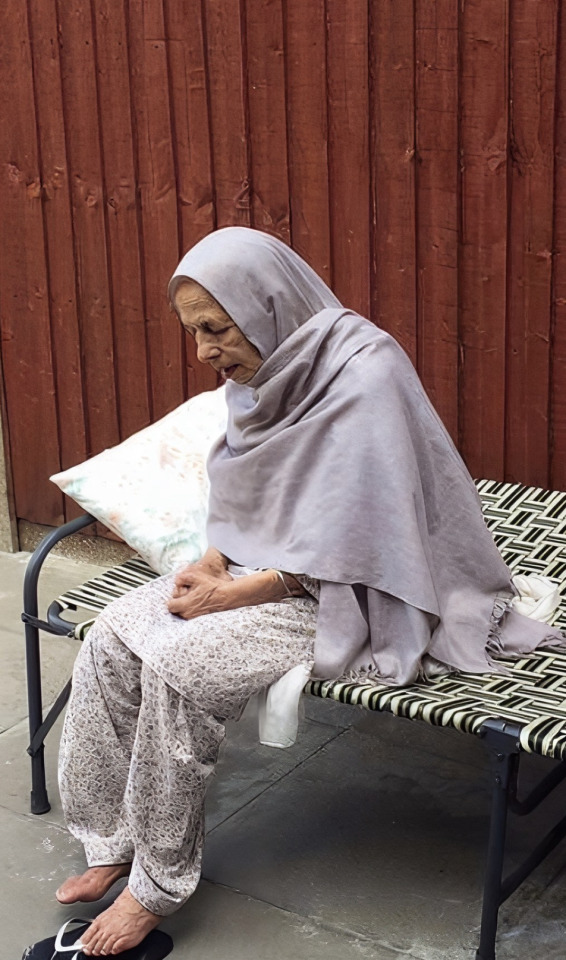

Clock - This is an item she always had in her room and she would always look at this to remind her of when to take her medicine or to complete her daily routines.


Her tattoo - "Ik Onkar" is a statement of oneness in Sikhism, with the meaning of "there is one God." The"ik" means "one" in Punjabi and "onkar," refers to the "absolute monotheistic unity of God." This tattoo symbolizes my grandmother’s faith in her religion and her strength and resilience for leaving her birthplace, which was in present-day Pakistan, for her faith in India during the partition.

Cardigan - Within the two cardigans I was given was her favourite one she would always wear this to events and with her traditional suits as she said it was comfortable and it matched her outfits perfectly.


Loafers - I remember going with her to purchase these as a comfy daily shoe as she needed a quick shoe for on the go and something simple. She especially liked the colour and the little floral cut outs in the shoe she thought they were cute.

Glasses - Her glasses were key as she wore them all the time and we always had our glasses appointments together. She loved the glasses frame she had and she even had her new prescriptions fitted into them. I remember them saying that it wasn’t possible because they might break however she convinced them to do it and I’m exactly the same I cherished the same frame I got comfortable with and wanted to get my prescriptions fitted into them.
0 notes
Text
Step into the intersection of faith and fashion with Sikh varsity jackets, a trend that seamlessly blends cultural pride with contemporary style. These jackets, adorned with traditional Sikh symbols such as the Khanda and Ik Onkar, serve as a powerful expression of identity and belonging within the Sikh community. With their bold designs and vibrant colors, Sikh varsity jackets not only pay homage to Sikh heritage but also make a statement in the fashion world. From bustling city streets to university campuses, these jackets stand as a symbol of unity and strength, bridging the gap between faith and modernity. Experience the fusion of tradition and trendsetting as Sikh varsity jackets redefine what it means to wear one's faith with confidence and style.
0 notes
Text

0 notes
Text

Ik Onkar with Guru Nanak Dev Ji tattoo on forearm..
#ikonkar #gurunanakdevji #nirbhau #nirvair #nirbhaunirvair #tattoo #tattooed #tattooing #tattooidea #tattooideas #tattoogallery #art #artist #artwork #rtattoo #rtattoos #rtattoostudio #ghatkopar #ghatkoparwest #mumbai #india
1 note
·
View note
Text
Religion
Me as a person, i like to say i am human, because if you would consider me as part of any other religion. I would not be sleeping in peace, for i will ponder again and again.
Why is there God but humans seems to keep fighting?
I like to consider myself as a half cast of any religion, personally, i feel that the one that provides is god under any language jurisdiction, although I love them all. Infinite blessings.
Where there was a time of medieval days of people were deliberately killing one another, to today we like to talk about one another just to be on top of one another.
Self esteem is a very unique trait to have but the influence people create at religious gatherings such of all or many kind tends to hinder a subject relating to society by ones that are not present.
It is sad, how hindrance still occur even though when we were trying to manipulate gravity or live on mars to a time where we need guidance to gain proper financial control for our families.
They say you will find good women in libraries and good men at religious events. I regret to inform you that both sometimes are there for different reasons.
Where one might be looking for a smart nerd and the other for a decent wife.
Regardless of any connection, whatever goes around comes back around, Karma and Dharma. Helping someone may make you feel great, and also make the person happy. Thus your Karma will return, if you keep doing your good work, your Dharma will unfold. Whatever abilities you may have are in your stomach, what energy you consist in your Chakra, all of this what i have just said are the way of Meditation of the Hindu tradition.
It is the same with any law of any religion really, but at the end of the day, regardless of what history there was, you are still walking, so you are writing your own. So in the end, for me, God is one, whereas in Punjabi it is recited Ik Onkar - There is only one God, god is one.
Muslims are very strict with their diversity and common laws, they are the ones that you could say pray the most in a week, maybe even fast for a whole month, from dawn to dusk, They cannot even eat or drink their saliva if they are fasting. They are the most righteous and smartest too. They know every makeshift known to any poverty justice.
Christianity is being guided by commandments that are pretty straightforward, do good to yourself, do good to others, respect others, respect your wife, provide, forgive and forget. Congregations are made just of that so people remain good-hearted.
China is different, they have not made many movies to be released on Netflix yet, I shall explain later.....
At the end of the day friends, God is one, let's start loving one another.
Just imagine if the whole world was part of one religion, imagine a world like that.

Now that is a different kind of god right :) its 2023 :)
0 notes
Text
Indies (Lifetime) Playlist Tributes to Music Legends ! - PART 6
A. R. RAHMAN 's TOP 470 (HINDI) COMPOSITIONS ! :
Yt Link:
Roja (Hariharan) -Roja
Chhoti si aasha – Roja
Yeh haseen vadiyaan – Roja
Roja (Balasubramaniam ) – Roja
Nahin saamne – Taal
Kya dekh rahe ho tum – Taal
Kaliyon si palken hain – Vishwa vidhaata
Gurus of peace
Vaishnava janato
Aayo re sakhi – water
Kuch bhi na socho – Bombay
Taal se taal – Taal
National anthem
Rukmini rukmini – Roja
Aankhon me ummeedon ke – Bombay
Man mohanaa – Jodha Akbar
Tumre bhavan mein – Delhi 6
Ik onkar –Rang De Basanti
Kun faya kun - Rockstar
Piya Haji Ali – Fiza
Khwaja mere khwaja – Jodha Akbar
Tu hi re – Bombay
“
Kehna hi kya – Bombay
Piya ho – Water
Hosanna – Ek Deewana Tha
Dil se re – dil Se
Muqabla muqabla – Humse hai muqabla
Urvashi Urvashi – “
Kal nahi tha voh kya hai – Vishwa vidhaata
” (sad version)
Hamma hamma – Bombay
Gopala gopala – Hum se hai muqabla
Premika ne pyar se – “
Kuchi kuchi rakma – Bombay
Ghanan ghanan – Lagaan
Rang hai – Meenaxi
Chhaiyya chhaiyya – Dil Se
Maa tujhe salaam – Vande Mataram
Mangal mangal – Mangal Pandey The Rising
“
Main tumhara – Dil Bechara
“
Nadaan parindey - Rockstar
Luka chuppi – Rang de basanti
Yeh jo des hai tera – Swades
Sofia – 99 songs
Jeans theme song – Jeans
Dil hai sanam dil – Chor chor
“
Sharminda hoon – Ek deewana tha
Naina neer – water
Mustafa Mustafa – Duniya dlwalon ki
Pal pal hai bhari – Swades
Sun ri sakhi – Hum se hai muqabla
Sagar se milne – Hum se hai muqabla
Kehta hai mera yeh dil – Jeans
Nazron ke milne se – Vishwa Vidhaata
Gum sum – Ada
Kaliyon si palken – Vishwa Vidhaata
Tu kuja – Highway
Dheemi dheemi – 1947 Earth
“
Dheeme dheeme – Zubeidaa
Roja roja – Dil hi Dil Mein
Aye nazini suno – Dil hi dil mein
Dola dola – Dil hi dil mein
Radha kaise na jale – Lagaan
Kahin aag lage – Taal
Gori god bhari – 99 Songs
Chanda re – Sapnay
“
Bharat humko – Roja
Anjali Anjali – Tu hi mera dil
Mil gaye mil gaye – Love Birds
Yeh chandni teri chahatein – Tu hi mera dil
Yeh rishta – Meenaxi
Bhor bhaye – Delhi 6
Maahi ve – Highway
Ay hairathe – Guru
“
O ri chhori – Lagaan
Enna sona – Ok Jaanu
Tum ho paas mere – Rockstar
Saton sur mil jaye toh – Tu hi mera dil
Ishq bina – Taal
“
Tere bina – Guru
Sarsariya – Mohenjo daro
Patakha guddi – Highway
Shyam rang bhar do – Water
Maine bheja hai sandesh – Hum se hai muqabla
Ek ladki thi – Love you hamesha
Ranjha ranjha – Raavan
Jashn –e baharaa – Jodhaa akbar
Chand aya hai – Dil hi dil mein
In lamhon ke daman mein – jodhaa Akbar
Tare ginn – Dil bechara
Tum ho meri nigahon mei – kabhi na kabhi
Zariya
Ae ajnabi – dil se
Kismat se tum – Pukar
Pyaar yeh jaane kaisa – Rangeela
Dost hai – Ekk deewana tha
Maya machhindra – Hindustani
Alaahda – Lekar hum deewana dil
Kahin toh hogi woh – Jaane Tu ya jaane na
Saathiya – Saathiya
O paalanhaare – Lagaan
Desh ki mitti – Bose the Forgotten hero
Lattoo – Ghajini
Gup chup baatein – Love you hamesha
Mehendi hai rachnewali – Zubeidaa
Heer – Jab tak hai jaan
Sunta hai mera khuda – Pukar
Saiyyan – Nayak
Jaana jaana - Duniya dilwalon ki
Na ho kal jab – Love Birds
Phoolon jaisi – Hum Se Hai Muqabla
Thoda thoda pyar – Priyanka
“
Tauba tauba – Jeans
Humnawaa – 99 Songs
Dhuan dhuan – Meenaxi
College ke saathi – Duniya dilwalon ki
Pagal anukan – Robot
Chupke se – Saathiya
Roop suhana lagta hai – The Gentleman
Mera rang de basanti – The Legend Of Bhagat Singh
Yeh tara woh tara – Swades
Yun hi chala chal – Swades
Naina milaike – Saathiya
Dil gira dafatan – Delhi 6
Sunn bhavara – Ok jaanu
Khamosh raat – Thakshak
Katiya karoon – Rockstar
I’ve been waiting – Jhootha hi sahi
Jwalamukhi – 99 Songs
“
Jhoom jhoom nacho – Chor Chor
Once upon a time – Lagaan
Maiyya yashodha – Jhootha hi sahi
Maula wa sallim – Ok jaanu
Ajooba – Jeans
Tum tak – Raanjhanaa
Ruth aa gayi re – Earth 1947
O humdum – Saathiya
Mangalayam – Saathiya
Aye udi udi udi – Saathiya
Chhalka chhalka – Saathiya
Sunle o janam – Tu hi mera dil
Jee lein – Ok jaanu
Mohenjo daro – Mohenjo daro
Sindhu maa – Mohenjo daro
Hum dum pyaara – Vishwa vidhaata
O aashiqua – 99 Songs
Suhana sama – Shivaji The Boss
Tum mera ha – Ada
Milo wahan wahan – Ada
Geet gaoon – Raunaq
Jab tak hai jaan – Jab tak hai jaan
So gaye hain – Zubeidaa
Bhangari marori – Water
Sona nahi na sahi – One 2 ka 4
Chhodo mori baiyaan – Zubeidaa
Kya hai mohabbat – Ekk deewana tha
Khulke jeene ka – Dil bechaara
Pyara sa gaaon – Zubeidaa
Chhalla – Jab tak hai jaan
Teri nazar – 99 Songs
Aawara bhawaren – Sapnay
Jogiya jogiya – The Legend Of Bhagat Singh
Ishq ada – Ada
Hai na – Zubeidaa
Boondon se baatein – Thakshak
Np problem – Love Birds
Dilli 6 – Delhi 6
So gaye hain – Zubeidaa
Mahive – The Legend Of Bhagat Singh
Raanjhanaa hua – Raanjhanaa
Azeem o shaan shahenshah – Jodha Akbar
Pyare panchhi baahon mein – Hindustani
Mujhpe toofan uthaye – Tehzeeb
Hai jaana hai jaana – Pukar
Raat ki daldal – Earth 1947
I am more
Dil dooba hai – Lingaa
Tu hai – Mohenjo daro
Tu mera hai – Ada
Sadda haq – Rockstar
Sarfaroshi ki tamanna – The legend Of Bhagat Singh
“ (sad version)
Piya milenge – Raanjhanaa
Satarangi re – Dil se
Aur ho – Rockstar
Sabaq aisa – Tehzeeb
Nazar laaye – Raanjhanaa
Khilli re – Raavan
Chhod chala nirmohi – Muthu Maharaja
Kabhi kabhi aditi – Jaane tu ya jaane na
Tu shining – Lekar hum deewana dil
Ok Jaanu – Ok Jaanu
Meherbaan – Ada
The humma song – Ok jaanu
Ranjha ranjha (remix) – Raavan
Ishwar allah – 1947 Earth
Aabhi jaa – Raunaq
Rangeela re – Rangeela
Columbus columbus – Jeans
O bhavre - Daud
Sach kahoon – Raunaq
Strawberry aankhen - Sapnay
Tu bole main boloon – Jaane tu ya jaane na
Come on come on – Lovebirds
Phoolon jaisi – Ekk deewana tha
Chika pika – The Gentleman
Latka dikha diya – Hindustani
Koi yahan roopmati – Priyanka
Allay allay – One 2 ka 4
Hai Rama – Rangeela
Ye jan – Daud
Tanha tanha – Rangeela
Yun hi chala chal (remix)- Swades
Phir se ud chala – Rockstar
Jaari jaa e hawa – Duniya dilwalon ki
Saawariya saawariya – Swades
Saajan aayo re – Ok jaanu
Ek tu hi bharosa – Pukar
Sai Shirdi sai – 99 songs
Paathshala – Rang de basanti
Mera yaar mila de – Saathiya
Ni main samajh gayi – Taal
Ye jo zindagi hai – 1947 Earth
“
“
Khili chandni – Priyanka
Mohabbat mein mera dil – Tu hi mera dil
Beqasoor – Lekar hum deewana dil
Behne de mujhe – Raavan
Des mere – The Legend Of Bhagat Singh
“
Dil se niklegi – The legend of bhagat singh
Rang de basanti – Rang de basanti (Contd)
1 note
·
View note
Text
youtube
New Video: Allah, Om, God, Ik Onkar: Aap Ki Manzil Kon? | Sufi Master Younus AlGohar | ALRA TV https://www.youtube.com/watch?v=FNoWF3U80UQ
Sufi Master Younus AlGoar provides the perfect formula to establish a spiritual symbiotic connection amongst people of all religions and reach the ultimate destination: God.
✅ Get the latest updates from ALRA TV on Telegram Messenger. Download Telegram Messenger from the AppStore or Google PlayStore and subscribe to: https://t.me/official_alratv
❓ Question Sufi Master Younus AlGohar directly! Text your questions to us on WhatsApp: +447472540642 or Facebook messenger: http://m.me/alratv
Watch the live recordings of these lectures every day at 22:00 GMT at: http://www.younusalgohar.com
For Izn e Zikr-e-Qalb (Permission for Awakening of the Spiritual Heart) call Shaykh Amjad Gohar on this number +44 (0) 740 1855 568 via WhatsApp.
📱Social Media Instagram: http://instagram.com/alratv https://www.instagram.com/younus_algohar
Twitter: https://twitter.com/AlRa_TV https://twitter.com/mehdifoundation https://twitter.com/MessiahFdn https://twitter.com/younusalgohar
Facebook: https://www.facebook.com/alratv/ https://www.facebook.com/HHYounusAlGo…
Websites: http://www.goharshahi.us/ http://www.theawaitedone.com/ http://thereligionofgod.com http://www.younusalgohar.org/
NEW URDU LANGUAGE WEBSITE http://www.mehdifoundation.com/
#Imam Mehdi#Gohar Shahi#Younus AlGohar#Sufism#Religion#God#Destiny#Motivation#Enlighten Heart#Spirituality#Divine Love#Inner Peace#Youtube
0 notes
Text
Inderpreet Luthra, Panchkula
Catalogue for Art Expo-Amritsar Summer 2023
(15 june - 30 aug) Curated by: Vulcan Art Gallery 📍 Timeless Amritsar 8 Queens'Road Amritsar

Artist Statement
Inderpreet Luthra, a skilled sculptor, wall painting artist, and art educator coming from Panchkula, showcases a profound affinity for spirituality in her artistic endeavors. Her body of work predominantly explores themes of spirituality, employing a diverse range of mediums such as wood cutting, clay, and wire to bring her visions to life. Drawing inspiration from her mother, as well as her surroundings and personal encounters, she crafts her pieces solely from the wellspring of her imagination. Her artworks serve as a means of expressing her innermost emotions and sentiments, while also serving as a channel through which she delves into her introspective thoughts. She holds the belief that art possesses an inherent power akin to a deity, capable of bestowing healing and facilitating meditation.
- inderpreet luthra
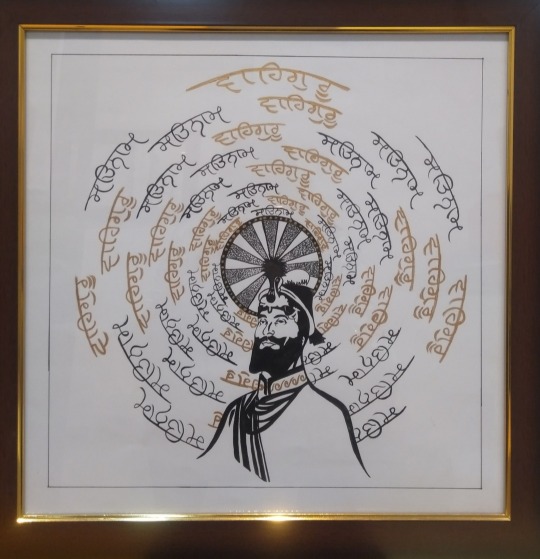
Kalghi Dhar
Acrylics on paper
19x19 in
₹3500/-
In this exquisite artwork, the Mandala art of Guru Gobind Singh Ji is showcased. Guru Gobind Singh Ji, revered as the divine incarnation of Kalgi Dhar Avtaar, commands the foreground with grace. The countenance of Guru Gobind Singh Ji emanates tranquility and serenity, captivating the viewers' gaze. The magnificent backdrop features the word "Waheguru," skillfully inscribed in lustrous golden acrylics, symbolizing the awe-inspiring illumination associated with the divine. "Waheguru" is the sacred mantra chanted by the deities Brahma, Vishnu, and Mahesh (Shiva), embodying the essence of the Agia Chakra mantra. Additionally, the profound significance of the term "Satnam" is depicted, representing the eternal and truthful nature of God's name.

Spirituality
Acrylics on brown board
8 x 8 in
₹2500/-
There are three captivating Mandala artworks, each showcasing a distinct and uplifting spiritual path. Within these artworks, I have depicted the sacred symbols of EK ONKAR, OM, and YIN YANG. The resplendent golden accents adorning all three pieces symbolize the transcendent power of the divine. At the heart of each artwork, the encompassing symbol of the respective deities from different religions radiates their divine power, imparting a sense of harmony, serenity, and divine beauty throughout the world
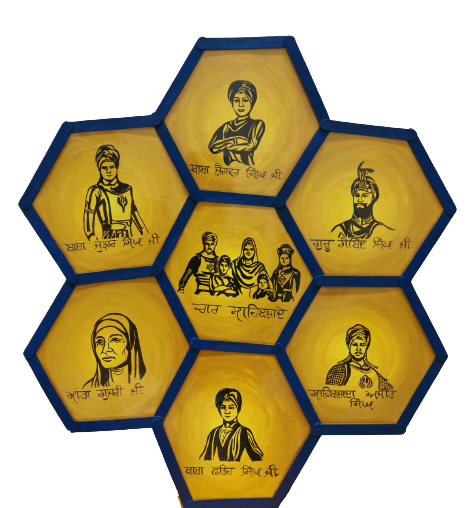
Promoters of Sikh Dharm
Mixed media
28x26 in
₹3500/-
This artwork is the depiction of the champions of Sikh Gurus who valiantly battled the Mughals. Mata Gujri Ji, Guru Gobind Singh Ji, and his esteemed Chaar Sahibzaade (Baba Fateh Singh Ji, Baba Ajeet Singh Ji, Baba Zorawar Singh Ji, and Baba Jhujhar Singh Ji) are portrayed, symbolizing their selfless sacrifices in upholding the honor and integrity of the Khalsa Panth in the face of Mughal oppression.
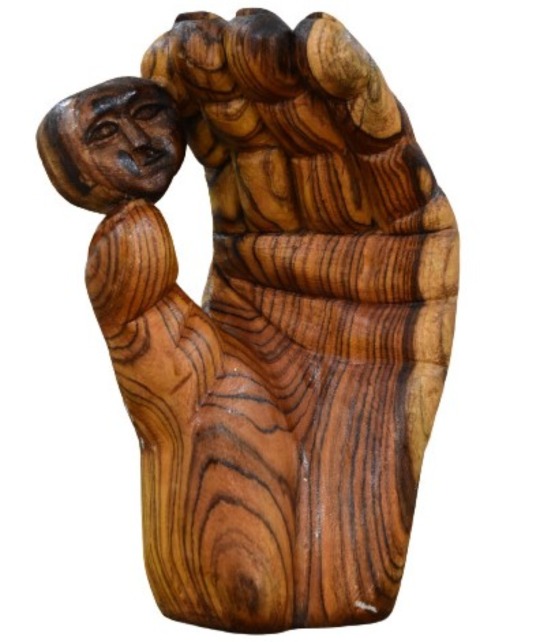
Untitled
Wood carving
8x12 in
₹9500/-
The hand symbolizes the divine presence of God, while the face represents the embodiment of humanity, a creation of God. Our actions are under the control of God; we are incapable of doing anything without his divine will. We are akin to puppets, merely following the predetermined path that God has already written for us. Every aspect of our past, present, and future is predetermined by God's plan. We obediently carry out his orders. God possesses unlimited power and is inherently benevolent.
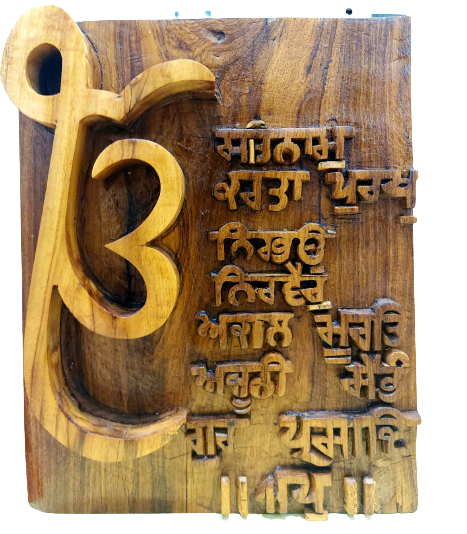
Waheguru G
Wood carving
10x12 in
₹7500/-
This artwork portrays the profound spirituality associated with Waheguru. On the left-hand side, the symbol "Ik Onkar" symbolizes the belief in the existence of a singular deity or creator, representing the ultimate reality. On the right-hand side of "Ik Onkar," the Mool Mantra is intricately carved into the wood using traditional woodcut tools. The Mool Mantra, penned by Guru Nanak Dev Ji, holds a revered place within the sacred scripture known as Guru Granth Sahib Ji. It encapsulates a concise yet profound depiction of the divine nature of God.
Support Partners for Art Expo - Amritsar Summer 2023
Anil Stores | Bharawan Da Dhaba | Bon Gateu Cafe | CASA Furnishings | Coffee & Bagels Cafe | IBT Institutes | Pink Peggy Cafe | Rai Language Academy | Tile World | Timeless Asthetics

0 notes